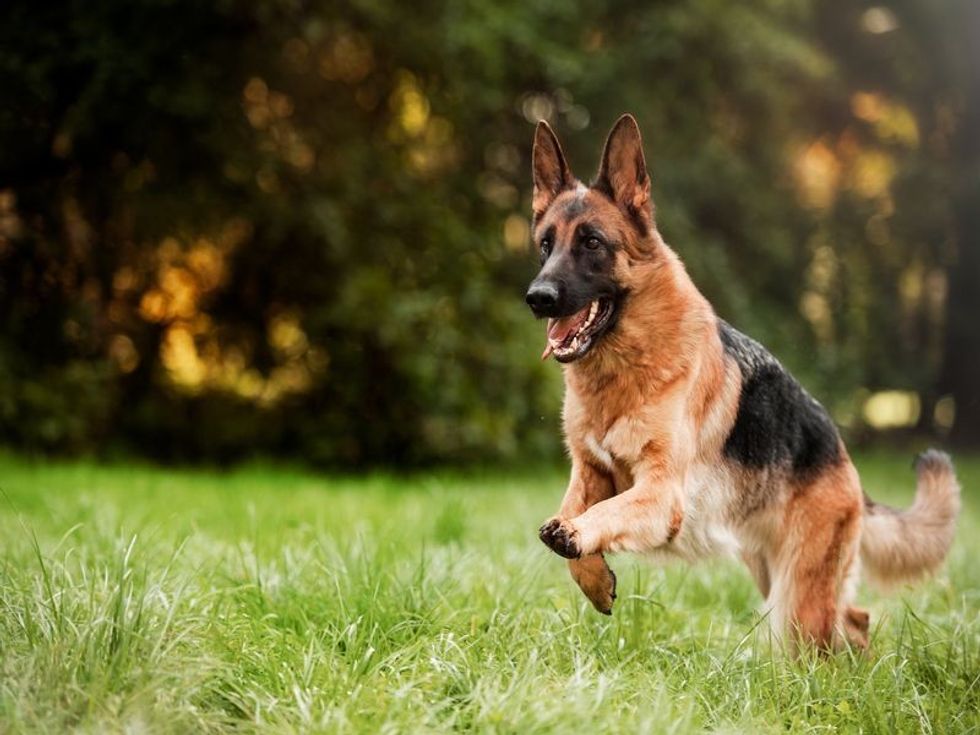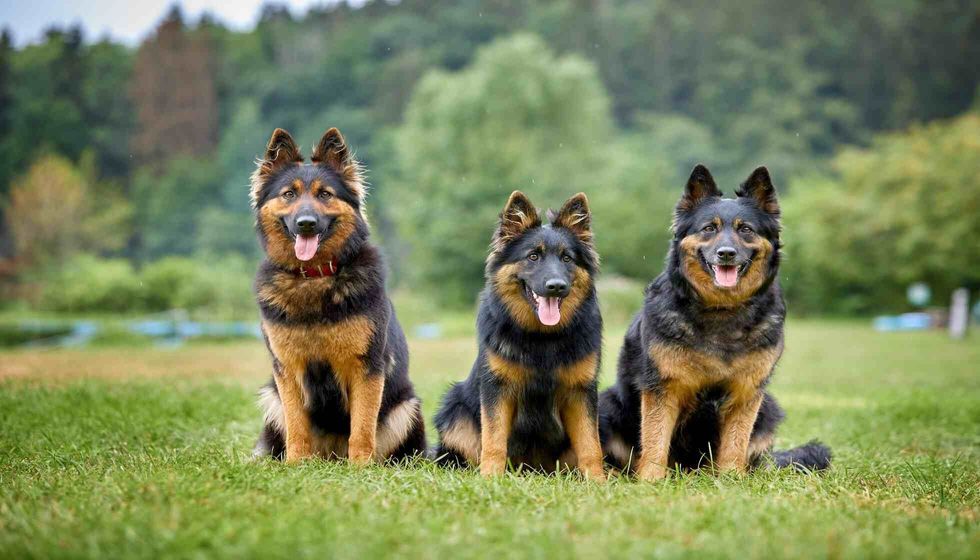How Long Do German Shepherds Live? Everything You Need To Know

The German shepherd is popularly known to be a working dog and it is a new dog breed.
They have been particularly used for sheep herding and many other activities. This dog is the fourth among the UK's most registered dog breed and holds the second position in the American Kennel Club.
These dogs are average to large and big-sized and are known to be among the strongest and healthiest. They have an appearance of a wolf due to their physical characteristics.
They can grow in great lengths and weight compared to many other dogs. They are definitely tough and strong but unfortunately, it is not a much-valued trait among these canines.
Their intelligence and loyalty is their main promising trait. These popular working canines are quite lovable and adorable.
German shepherds are disciplined dogs who follow, respect, and obey their owners pretty quickly and they are the perfect rescue, search, police, and guard dogs. They are popularly known to follow instructions perfectly.
Compared to those other big dog breeds, German shepherds generally stay alive fairly for a long time, particularly when they are made to visit a vet regularly and kept busy with activities. It is quite sad to think about your dog growing senior and old but this is inevitable since a dog's life is undoubtedly shorter than humans.
Generally, it has been discovered that the average German shepherd's lifespan is around 10-14 years. However, as per the American Kennel Club (AKC), it has been registered that their total lifespan is only around 7-10 years.
In the American region, most German shepherds have been bred to be a breed of dog show standard, generally calling for a back that is sloped.
Unfortunately, this type of breed's sloped back offers a higher dog’s risk of health issues like elbow dysplasia, hip, and several other joint and back problems which all contribute to affecting a dog’s mobility.
Also, they usually acquire behavioral problems like biting, chewing, destructive attention-seeking behavior, loud and continuous barking, and so on.
On the other hand, in Germany, many GSDs are supposed to pass some tests for proving that they are mentally and physically sound before breeding them.
When the German shepherds in Germany and American German shepherds are compared, the ones in Germany perform well overall and have very few problems of mobility compared to the other. According to records, the longest living German shepherd was about 18 years old.
If you want to learn more similar content, you can also visit these how long do boxers live and how long do bulldogs live.
The Average Lifespan Of A German Shepherd
The average lifespan of a dog generally depends on its lineage. It also decides upon the type or kind of health problems that one might encounter in their life span, as they grow older.
Their average lifespan is important for owners to understand as their diet and lifestyle greatly influence it. Dog owners should be sure to maintain their German shepherd age chart to understand their different diet needs, and overall health, while consulting an expert vet for it.
German shepherd lifespan lies between 10-13 years. Some of the tiny breeds of German shepherd dogs usually live up to 20 years, but bigger dogs put a higher strain on their bodies and naturally do not live as long.
A German shepherd can die around the age of eleven in the absence of exercise.
On average, female German shepherds live up to 12-14 years, while male German shepherds live up to 11-13 years. Females tend to live longer than males.
A German shepherd's age limit is unsure as they can live up to 18 also, considering the longest living GSD. To improve their lifespan, feed them with good and nutritious food.
Follow up with regular checkups to your vet to discover any pain, health issues, or diseases that they might suffer. As your German shepherd ages, it is important to be careful and make sure of the kind, type, and amount of food that you feed them to keep a check on the dog's health.
A German shepherd's life needs a lot of activity and playtime as they are quite active and this can prevent joint problems and other related diseases when they get old.
Also, they are beneficial for a senior or aged person to keep since they are docile and calm in nature, and they can eventually become their best friend. They can also provide a guide to blind people.
How to improve the life expectancy of German shepherds?
Generally, a German shepherd's lifespan is between 10-15 years, and there are several things an owner can do to improve their life span.
Their health is important to increase their lifespan in a natural way.
An older dog may seem content just lying around the house, but if your dog is about six to seven years old, and not really old, keeping him moving is very essential.
If they are only permitted to hang around the home, they will likely age faster and will surely not be as happy or healthy as they develop in life.
Even though they are very prone to not just one disease, but many diseases, there are many ways you can keep your German shepherd living a healthy and long life.
Visit your vet regularly: The next time you take your German Shepherd to the veterinarian, it is worth doing your research on your dog's life expectancy, even if it is quite young. Your veterinarian can check your dog's present health.
They can tell you what problems they have had in the past or warn you of problems that are in their early stages and tell you how long your dog is likely to live.
Your veterinarian should also be able to tell you specifically what to do to help your dog live as long as possible.
You need to take them to a vet once in twelve months during juvenile and about twice per year as they age, for health checkups. Generally, dogs conceal the pains they experience, so regular checkups can catch disorders like dysplasia of the hips prior to seeing your dog limping.
Maintain a healthy weight in your dog: Many dogs which have been domesticated are obese, and dogs encounter several similar obese-associated diseases or illnesses as humans. Also, any additional weight can put even more pressure on already sore joints among dogs particularly prone to diseases like arthritis or hip dysplasia.
Several proven factors have been unraveled to help you recognize if your dog is suffering from obesity.
Their waist should be inward while observing from above or their side when they are standing.
Ensuring that your dog is provided with a proper, nutritious diet can be more difficult than you might expect. In case you find your GSD being overweight, consult a vet regarding the most reliable solution to cater them lose weight cautiously.
Find a well-respected breeder: German shepherds have been a popular dog breed, therefore, many breeders just want to earn wealth from breeding dogs and are not engaged in improving or upgrading the health of the breed.
Dogs that are generally bred or brought up for money of their looks have more chances to endure genetic disorders such as degenerative myelopathy or hip dysplasia compared to German shepherds who were bred with the purpose to serve and stay healthy.
Since German shepherds from the lines of Americans might have a smaller lifespan compared to the German ones.
It will be definitely worth seeking out well-respected breeders, with experience in including dogs that are a breed of German shepherds in their programs of breeding to build up the breed and decrease the possibility of genetic or ancestral diseases.
Feed good quality food to your dog: Many commercial dog foods have been marked as proteinous and nutritious, which is not always true. Most foods for pet dogs contain fillers like meat or corn by-products that have tiny to less or no nutritional worth.
Like how healthy eating helps people live a better and longer life, good quality food for dogs can cater your GSD to live a healthier life.
Daily exercise: Most pets require exercise daily, to protect and prevent themselves from health problems like obesity and stay fit and away from health concerns. German shepherds acquire tremendous levels of energy which is quite destructive if they do not get proper exercise.
Exercise can greatly influence their overall lifespan. They require at least 30 mins to an hour of exercise daily.
Originally, they were bred to perform tasks and work the entire day, so a regular walk two times a day might be insufficient. Some of the exercises you can do with your dog include playing in a park, running, walking beside you while cycling, playing fetch, jogging, hiking, and many more.
German Shepherds love their jobs as they were bred to work all day. This can help improve their overall health.
They love to be therapy dogs, sheepdogs, guard dogs, police dogs, and rescue dogs. If you do not have enough time to spend outside with your dog, you can teach them something to do at the house, such as keeping their toys in one place or checking on the kids.

Causes Of Death In German Shepherds
Many animals are prone to certain health issues and diseases. Some are hereditary, while others are due to improper diet, unstructured lifestyle, old age, injury, and much more.
Many health issues have been taken into consideration that can steer to the decease or death of your pet dog.
Issues with regard to mobility, such as arthritis, hip dysplasia, and problems associated with the back are several biggest reasons that can greatly affect and interrupt a German Shepherd’s lifespan.
Directly, a mobility problem or issue may not kill or affect a dog, but the contributing factors that decrease the quality of life may cause owners to put to sleep or euthanize their dog to free them of great pain.
Other several factors that can greatly affect the lifespan of your German shepherd are as follows:
Bloating – This is a condition where the belly of the dog gets filled with air and its axis gets twisted. This blocks the continuous supply of blood to its stomach. To avoid this, ensure to provide a split dog's food in smaller multiple meals. Pay attention to them closely in such cases.
Degenerative myelopathy – A backward spinal cord disease that comes with no chance of healing, and then leads to a condition of paralysis. This is more commonly seen among German shepherds when compared to other breeds of dogs.
Dysplasia of the hip– This is often known to be a condition that is quite painful for the dog since their thighbone starts to deteriorate and does not fit proportionately in the socket of the hip. This condition generally leads to mobility and arthritis issues.
This is mostly experienced by dogs of senior age, especially among large breeds of dogs.
Hemangiosarcoma – This is an aggressive, hostile form of cancer, that greatly ruins the cells that stroke the blood vessels. This type of illness is quite common among German shepherds.
Epilepsy – This illness is treatable in many cases, but seizures can turn quite fatal. Some of them eventually die as their seizure gets worst and more frequent.
There are other health factors that can affect a German shepherd's quality of life, even though it may not affect their lifespan.
Other than these, there are other factors that also threatened a German shepherd's life such as exocrine pancreatic insufficiency (EPI), allergies, vision problem, and so on.
Most of the large breeds of dogs are liable to joint problems and hip issues. However, these problems of back, hip, and joint are quite commonly found in German shepherds than many other breeds due to their original sloped back.
Once and for all, it is important to take your dog pet for regular checkups to a vet, to ensure that they are healthy and provide early treatment even if they are suffering from any disease or pain.
How long do German shepherd mixes live?
The lifespan differs from one breed to the next, depending on their lineage, health history, size, weight, diet, and much more. Some dogs may be healthier and live longer than others mainly because they are taken care of greatly.
For instance, a street dog may have a shorter lifespan than a dog raised with care and love by its owner.
Following consist of life key traits, expectancy, AKC breed, and AKC groups standards for shape and sizes of the parents purebred of a black lab German shepherd mix.
Their life expectancy is between 7-10 years as stated by AKC. Other information and research sources made is quite different, for example, VCA hospitals noted their life expectancy to be around 10-12 years.
More than 3000 years ago, the first bred sledding dog was the Siberian husky, while German shepherds were herding dogs from Germany since 1899.
The definite detail and history regarding this mix remain unknown, and it hasn't been discovered yet, as to why, where, and for what purpose they were bred. These breeds are both commonly described and known as working and intelligent, loyal dogs.
The mix of German shepherd and husky lifespan has been expected on average, to be between 10-13 years old and they generally grow quite big in size.
Here at Kidadl, we have carefully created lots of interesting family-friendly facts for everyone to enjoy! If you liked our suggestions for how long do German shepherds live, then why not take a look at how long do pugs live, or German shepherd fact
We Want Your Photos!
More for You
See All
Bachelor of Science specializing in Mass Communication.

Adekunle Olanrewaju JasonBachelor of Science specializing in Mass Communication.
Disclaimer
1) Kidadl is independent and to make our service free to you the reader we are supported by advertising. We hope you love our recommendations for products and services! What we suggest is selected independently by the Kidadl team. If you purchase using the Buy Now button we may earn a small commission. This does not influence our choices. Prices are correct and items are available at the time the article was published but we cannot guarantee that on the time of reading. Please note that Kidadl is a participant in the Amazon Services LLC Associates Program, an affiliate advertising program designed to provide a means for sites to earn advertising fees by advertising and linking to Amazon. We also link to other websites, but are not responsible for their content.
2) At Kidadl, we strive to recommend the very best activities and events. We will always aim to give you accurate information at the date of publication - however, information does change, so it’s important you do your own research, double-check and make the decision that is right for your family. We recognise that not all activities and ideas are appropriate for all children and families or in all circumstances. Our recommended activities are based on age but these are a guide. We recommend that these ideas are used as inspiration, that ideas are undertaken with appropriate adult supervision, and that each adult uses their own discretion and knowledge of their children to consider the safety and suitability. Kidadl cannot accept liability for the execution of these ideas, and parental supervision is advised at all times, as safety is paramount. Anyone using the information provided by Kidadl does so at their own risk and we can not accept liability if things go wrong.
3) Because we are an educational resource, we have quotes and facts about a range of historical and modern figures. We do not endorse the actions of or rhetoric of all the people included in these collections, but we think they are important for growing minds to learn about under the guidance of parents or guardians.







